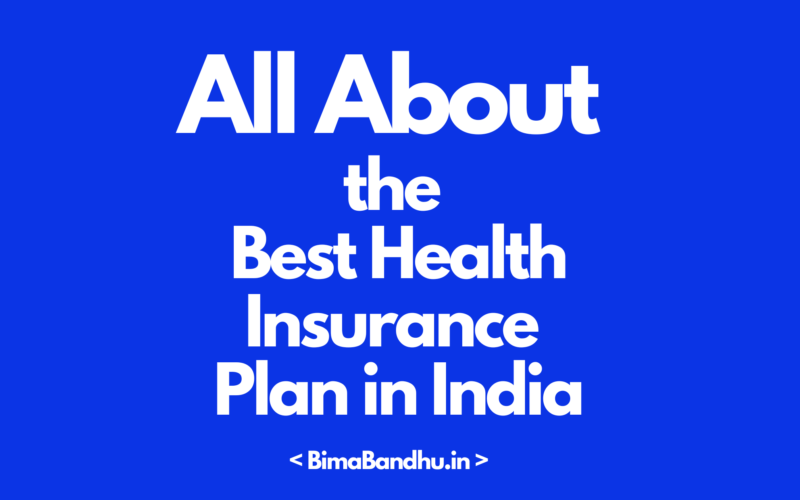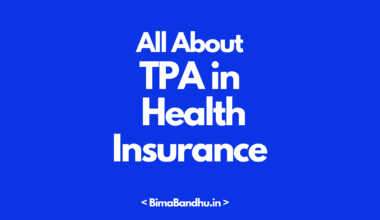For many of you, your pursuit of a balanced and fulfilling life often leads you to overlook maintaining good health. While you strive to maintain a healthy lifestyle, the unpredictable nature of life can throw unexpected challenges your way. In such moments of vulnerability, a robust health insurance plan stands as a reliable shield against financial turmoil. However, the journey to select the right health insurance plan can be akin to navigating a maze, especially in a diverse and dynamic country like India.
If you have ever searched for a medical insurance plan, you would agree that it’s all too easy to be enticed by the allure of ‘best health insurance plans’. This is what is often showcased in glossy advertisements and persuasive marketing campaigns. Various plans promise the world – from comprehensive coverage to seemingly unbeatable benefits. Yet, as you dive deeper into the intricacies, it becomes apparent that making an informed choice is far more complex than selecting the plan from the list of top ten or top 20 options.
In this blog post, we will unravel what selecting the best health insurance actually means. We will offer practical insights to empower you in making a choice that aligns with your unique needs and financial security. Let’s get started from the basics.
What Do You Mean By the Best Health Insurance Plan in India?
When you talk about the best health insurance plans, you might think of it as a one-size-fits-all insurance product that offers extensive coverage with minimal out-of-pocket expenses. However, this perception can be misleading and potentially harmful if not examined closely. In reality, the best health insurance plan in India is not a universal entity. Rather, it is profoundly personal and tailored to your unique circumstances. Here’s why:
-
Coverage specific to your needs
The best plan for you aligns with your health needs. This means covering treatments, medications, and medical services that you and your family are most likely to require. For instance, if you have a chronic illness, the best plan would offer comprehensive coverage for that condition.
-
Affordability
Affordability is a crucial factor when determining the best health insurance. It’s not about choosing the most expensive one with the belief that it must be the best. Instead, it’s about finding a plan that offers adequate coverage without straining your budget.
-
Network of hospitals and doctors
The best plan would include a network of hospitals and healthcare providers that are easily accessible to you. No matter how comprehensive a plan may seem, it’s of little use if the hospitals and doctors it covers are not accessible in your area.
-
Additional benefits
You should also consider additional benefits like maternity coverage, critical illness coverage, or wellness programs if they align with your life stage and health concerns. These can make a plan more valuable to you.
Also Read: Maternity Insurance: A Complete Guide
This takes us to an important aspect that you must know about:
Selecting from the list of the best plans vs. choosing the best plan for you
It’s a common misconception to assume that the best health insurance plans touted in advertisements would automatically serve your needs. These plans often garner attention due to their popularity, but popularity does not equate to suitability for your unique circumstances.
Selecting from a list of the best plans can be a helpful starting point. These plans often have a reputation for reliability and quality service. However, the crucial step is to assess these plans in light of your specific health needs, financial situation, and preferences.
Making a choice from a list of the best plans and selecting the best plan for yourself may not be synonymous. For instance, the best plan for you might not be the one with the highest premiums or the most extensive coverage. Instead, it’s the one that strikes the right balance between comprehensive coverage and affordability and aligns better with your health profile.
Read More: What Does Section 80C Cover?
Why Should You Buy The Best Health Insurance Plan Only?
Purchasing the best health insurance plan is undeniably crucial. However, it’s essential to recognize that the definition of the best plan will vary from person to person. Let’s explore the reasons why buying the best health insurance plan for your specific needs is quite important.
- Each individual has unique healthcare needs, depending on factors such as age, existing health conditions, family size, and lifestyle. The best plan for you will provide coverage that aligns with your specific requirements, ensuring that the treatments, medications, and services you need are included. For instance, if you have a family with old parents, the best health insurance plan for family will include an adequate sum insured to cover their healthcare treatments whenever required.
- Health insurance is a safety net that shields you from the financial burden of unexpected medical expenses. The best health insurance will strike a balance between adequate coverage and affordability. Opting for a plan that offers excessive coverage you don’t need might strain your budget, while choosing one with insufficient coverage can leave you vulnerable to high medical bills. The best plan for you will provide the protection you need without breaking the bank.
- The best plan will also grant you access to a network of hospitals and healthcare providers that are conveniently located. No matter how comprehensive a plan may seem, it may not be beneficial if the hospitals it covers are not in your area. Accessibility is a critical factor, especially during emergencies when you need immediate medical attention.
- Your life stage plays a significant role in determining the best plan. For example, a plan that is suitable for a young, healthy individual might not be the best choice for someone nearing retirement. The best plan will adapt to your evolving needs and accommodate life changes, such as starting a family or preparing for retirement.
- Many health insurance plans offer add-on benefits like critical illness cover or dental care. The best plan for you will consider your unique circumstances and preferences, incorporating these additional benefits if they align with your health and lifestyle goals.
- Ultimately, the best health insurance plan in India offers peace of mind. It ensures that you and your loved ones are covered during medical emergencies, thus reducing stress and anxiety in critical scenarios. Knowing that you have a plan tailored to your needs provides a sense of security that is priceless.
Before we take you to the steps to select the best plan for yourself and your family, let’s emphasize an important aspect:
Should You Check the List of the Best Health Insurance Plans?
Checking the list of the best health insurance plans or top ten health insurance plans can be a valuable starting point in the process of selecting health coverage. But it should not be the sole determining factor in your decision-making. Here’s why you should consider reviewing such lists and how to use them effectively:
Pros of Checking the List of the Best Health Insurance Plans:
- These lists are often compiled by financial experts, healthcare professionals, or independent agencies who evaluate health insurance plans based on various criteria. Their expertise can help you identify reputable and reliable insurance providers and plans.
- Plans that consistently appear on these lists may be perceived as having a good track record of customer satisfaction, financial stability, and claims processing efficiency. This can offer assurance about the plan’s reliability.
- Lists of the best health insurance plans typically provide a side-by-side comparison of plan features, including coverage, premiums, deductibles, and additional benefits. This makes it easier to compare options and identify plans that align with your needs.
Considerations when checking such lists
- Keep in mind that the definition of the best plan varies from one person to another. What is suitable for one individual or family may not be the best fit for another. Therefore, you should consider your unique healthcare needs, budget, and preferences when evaluating plans.
- Look beyond the ranking and delve into the details. Assess whether the coverage offered by the top-ranked plans aligns with your specific health requirements. For example, if you have a chronic illness or anticipate certain medical expenses, prioritize plans that offer comprehensive coverage in those areas.
- Ensure that the list includes information about the network of hospitals and doctors associated with each plan. Access to preferred healthcare providers is essential, which is why you should verify that the plan you choose has providers in your locality.
- While top-ranked plans may offer extensive coverage, they can also come with higher premiums. This is where you need to evaluate the cost of the plan in relation to your budget to ensure it’s affordable in the long term.
- In addition to expert opinions, you can also consider reading customer reviews and testimonials to get a sense of how well a plan serves its members. Real-life experiences can provide valuable insights into the quality of service and claims processing.
- Carefully review the policy terms and conditions, including exclusions and waiting periods. These details can significantly impact your coverage and should be in line with your expectations and needs.
Recommended Read: All About Waiting Period in Health Insurance
How to Choose the Best Health Insurance Plan in India: 9-Step Guide
Choosing the best health insurance plan in India requires careful consideration and thorough research to ensure it aligns with your unique healthcare needs and financial situation. Here are the steps to help you make an informed decision:
1. Select an adequate sum insured
Selecting an adequate sum insured is a crucial step when choosing the best plan in India. The sum insured represents the maximum coverage amount your insurance policy will provide for medical expenses in a given year. This matters because the primary purpose of health insurance is to protect you from the financial burden of unexpected medical expenses. An adequate sum insured ensures that you have enough coverage to pay for hospitalization, surgeries, doctor’s fees, diagnostic tests, and medications without exhausting your savings or facing financial strain.
Besides this, healthcare costs in India, like in many other countries, tend to rise over time due to inflation. What may seem like a sufficient sum insured today may fall short in the future when you actually need it. Choosing a sum insured that accounts for future inflation ensures that your coverage remains effective in the long run.
2. Choose the right coverage type
Choosing the right coverage type, whether individual or family, is yet another critical step when selecting the best health insurance plan. The decision you make regarding coverage type affects the extent of protection you and your loved ones will receive under the policy.
To make the right selection, start by assessing your family structure. Determine who you want to include in the health insurance policy. Consider immediate family members such as your spouse and children, as well as dependent parents or siblings who may rely on you for financial support and healthcare coverage. Then evaluate the healthcare needs of each family member and consider factors such as age, pre-existing medical conditions, and the likelihood of medical treatments or hospitalizations.
While individual health insurance plans are designed to cover a single person, family floater health insurance plans provide coverage for all family members under a single policy. Before you select any of them, compare the cost of individual policies versus family policies. While family coverage may seem cost-effective when covering multiple family members, it’s essential to ensure that the sum insured is adequate to meet the collective healthcare needs of your family.
Also Read: Why Buy 1 crore Health Insurance?
3. Check the waiting period for pre-existing diseases
A waiting period is a specified duration during which the insurance company does not provide coverage for pre-existing medical conditions. More particularly, pre-existing diseases are medical conditions that exist at the time of purchasing a health insurance policy. These can include chronic illnesses like diabetes, hypertension, heart disease, or any other health condition you were already diagnosed with before buying the policy.
Health insurance plans typically impose waiting periods for pre-existing diseases to mitigate the risk of adverse selection. If there were no waiting periods, individuals could buy insurance only when they know they need treatment, which would be financially unsustainable for insurance providers. Therefore, it’s essential to understand the waiting period for pre-existing diseases to manage your healthcare expenses effectively.
Besides this, it’s crucial to be honest and transparent about your medical history when purchasing a health insurance policy. Failure to disclose pre-existing conditions can lead to claim rejections in the future.
4. Check the maximum age to renew health insurance
Checking the maximum renewal age is an important step because the maximum renewal age defines until what age you can renew your health insurance policy. It is also an indicator of how long you can maintain continuous health insurance coverage.
As individuals age, they tend to face an increased risk of health issues and medical expenses. Having health insurance coverage into your senior years becomes particularly important and ensures that you can access medical care when you need it the most. Choosing a plan with a high maximum renewal age allows you to maintain your policy without the need to purchase a new one as you get older. Continuity of coverage is essential to avoid coverage gaps that may arise if you have to switch to a new policy.
Ideally, you should select a plan with a maximum renewal age that aligns with your expected healthcare needs throughout your lifetime.
5. Check insurers’ Claim Settlement Ratio (CSR)
CSR is a metric that indicates how efficiently an insurance company processes and settles claims filed by policyholders. A high CSR reflects the reliability and trustworthiness of an insurance provider. It suggests that the company has a track record of fulfilling its commitment to policyholders by settling claims promptly and fairly.
Furthermore, the efficiency of claim settlement is crucial during a medical emergency. A high claim settlement ratio indicates that the insurance company is more likely to provide timely financial assistance when you need it the most. It is less likely to engage in dispute or delay tactics when processing claims. This will reduce the hassles and stress associated with the claims process for policyholders.
6. Consider network hospitals for cashless hospitalization
In insurance terms, network hospitals are healthcare facilities that have a tie-up or agreement with your insurance provider to provide cashless medical services to policyholders. The best health insurance plans that offer cashless hospitalization through a network of hospitals provide you with easy access to medical care. You can receive treatment without having to pay upfront and then seek reimbursement from the insurer.
Cashless hospitalization also reduces the financial burden during a medical emergency. You don’t need to worry about arranging funds for immediate hospitalization or procedures, as the insurance company directly settles the bills with the network hospital. The process is generally more streamlined compared to reimbursement claims, which can involve paperwork and delays.
To select the best plan, check if the health insurer’s network includes hospitals and healthcare providers that are conveniently located for you. A wider network ensures that you have access to quality medical facilities in your vicinity or even when you are traveling.
7. Compare premiums of different health insurance plans
Comparing premiums allows you to assess whether a health insurance plan fits within your budget. By comparing the premiums of different plans (from the same or different insurers), you can evaluate their cost-effectiveness. After all, it’s essential to select a plan with premiums that you can comfortably afford without straining your finances.
As a step forward, consider the coverage and benefits offered by each plan in relation to the premium you’ll be paying. Ensure that you’re getting value for your money. You can choose the best health insurance plan with a premium that aligns with your specific healthcare needs.
Here, finding the right balance between coverage and budget is crucial. While it’s tempting to opt for the plan with the lowest premiums, it’s equally important to ensure that the coverage provided meets your healthcare requirements.
8. Read policy exclusions carefully
For your information, policy exclusions are specific conditions, treatments, or circumstances for which the insurance company will not provide coverage. By carefully reviewing policy exclusions, you gain a clear understanding of the limitations of your health insurance coverage. This will help you manage expectations and avoid surprises when making a claim.
Reading exclusions also prevents misunderstandings and ensures that you know which medical expenses are not covered by your policy. It helps you make informed decisions about your healthcare and financial planning.
In general, policy exclusions typically cover treatments or procedures that are considered elective or cosmetic, as well as certain high-risk activities or self-inflicted injuries. Knowing these exclusions helps you identify potential coverage gaps. For example, if you have specific healthcare needs or anticipate certain treatments, you should look for policies that cover those health conditions.
9. Select add-ons or riders only if needed
Add-ons or riders are additional coverage options that you can include with your base health insurance policy. Each add-on comes at an extra cost. This is why selecting only the riders that you genuinely need helps you manage your premium expenses effectively. It prevents unnecessary spending on coverage that may not be relevant to your healthcare needs.
On the bright side, you can customize your health insurance policy to better suit your specific requirements. By selecting only the add-ons you need, you can tailor your coverage to address your unique healthcare concerns. If you have specific concerns or anticipate certain medical expenses, such as maternity care or critical illness treatment, choose riders that provide coverage for those needs. This ensures that your health insurance is comprehensive in areas that matter most to you.
Also Read: All About 10 Lakh Health Insurance
FAQs
Which health insurance is best now?
The definition of the best health insurance plan varies depending on individual needs and preferences. To determine the best plan for you, assess your healthcare requirements, budget, and preferred features. Compare different policies, considering factors like coverage, network hospitals, and premium costs. It’s advisable to read detailed insurance guides for more information.
How to choose the best health insurance for myself?
To choose the best health insurance, follow these steps:
- Assess your healthcare needs
- Set a budget for premiums
- Research reputable insurance providers
- Compare plan options and features
- Review policy terms and exclusions
- Consider network hospitals and claim settlement history
- Select a policy that aligns with your needs and budget
Which is the best family health insurance plan in India?
The best family health insurance plan in India depends on your family’s specific needs. Some popular options include policies that offer comprehensive coverage, a wide network of hospitals, and additional benefits like maternity coverage if needed.






